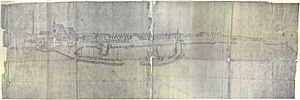Jasper Danckaerts facts for kids
Jasper Danckaerts (born May 7, 1639, in Vlissingen; died between 1702 and 1704 in Middelburg) was an important figure in early American history. He helped start a small community of people called Labadists in what is now Maryland. This group settled along the Bohemia River.
Danckaerts is most famous for his detailed journal. He wrote this journal while traveling through parts of North America in 1679 and 1680. His writings give us a great look at the land and how people lived in that area during the late 1600s.
Contents
Who Was Jasper Danckaerts?
Jasper Danckaerts was from the Netherlands. He was part of a religious group called the Labadists. These were a group of pietists, meaning they focused on strong personal religious devotion. They wanted to create a special community where they could live according to their beliefs.
To find the perfect spot for this new community, Danckaerts and another Labadist, Peter Sluyter, traveled to North America. They were like explorers looking for a new home.
The Big Trip to America
In 1679, Jasper Danckaerts and Peter Sluyter began their journey. They explored areas that were once part of New Netherland. This region now includes parts of New York, New Jersey, and Delaware. Their diary tells us all about their adventures and what they saw.
During their travels, they met Ephraim George Herman. He was the son of a well-known person named Augustine Herman. Ephraim introduced them to his father.
Starting a New Home
Augustine Herman first allowed the Labadists to settle on his land. Later, in 1683, he gave them a large piece of land. It was about 3,750 acres (15 square kilometers).
The Labadists then started their colony. Peter Sluyter was the main leader of this new settlement. However, the community did not grow very large. It never had more than about 100 people. The settlement eventually ended after 1720.
His Famous Journal
Jasper Danckaerts' journal is a very special historical document. It gives us a rare glimpse into life in North America during the late 1600s. He wrote about the landscapes, the towns, and the people he met.
The original Dutch journal was found in 1864 in an old bookstore in Amsterdam. An American named Henry C. Murphy bought it. He then had it translated into English and published it in 1867. A newer version was published in 1913, making it easier for more people to read.
Life After the Colony
After their first trip, Danckaerts and Sluyter returned to Europe on July 23, 1680. They came back to America later that year with the people who would form the colony.
Jasper Danckaerts then traveled to a settlement called La Providence in Dutch Guiana. This colony did not last very long. In 1684, he became a citizen of Maryland. But he soon returned to the Netherlands. He spent most of the rest of his life in a place called Wieuwerd. He passed away in Middelburg between 1702 and 1704.
 | Anna J. Cooper |
 | Mary McLeod Bethune |
 | Lillie Mae Bradford |


